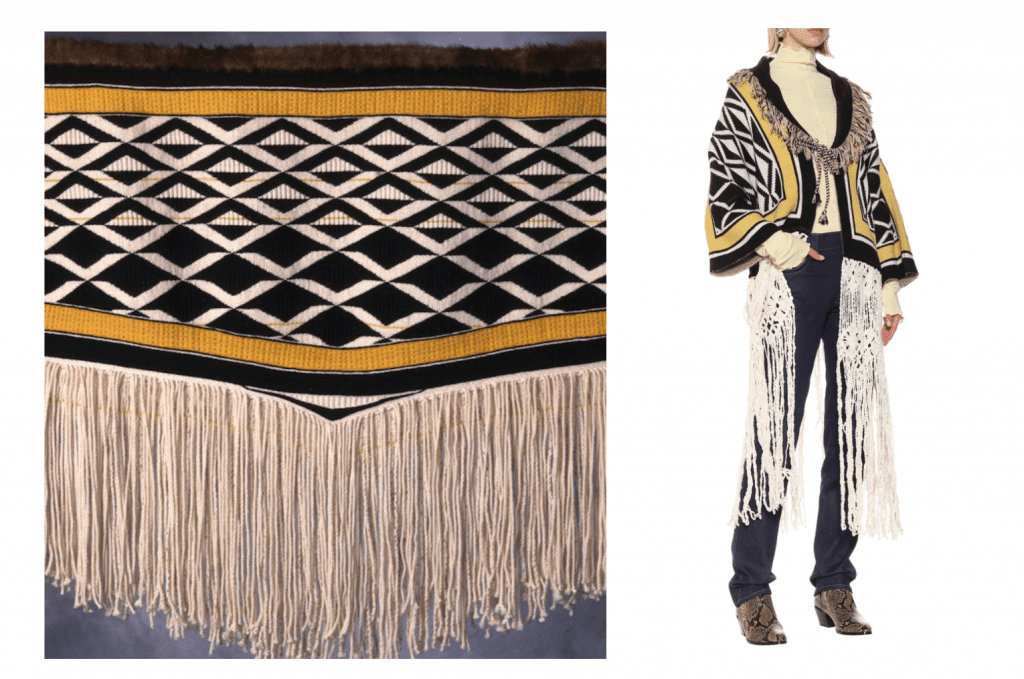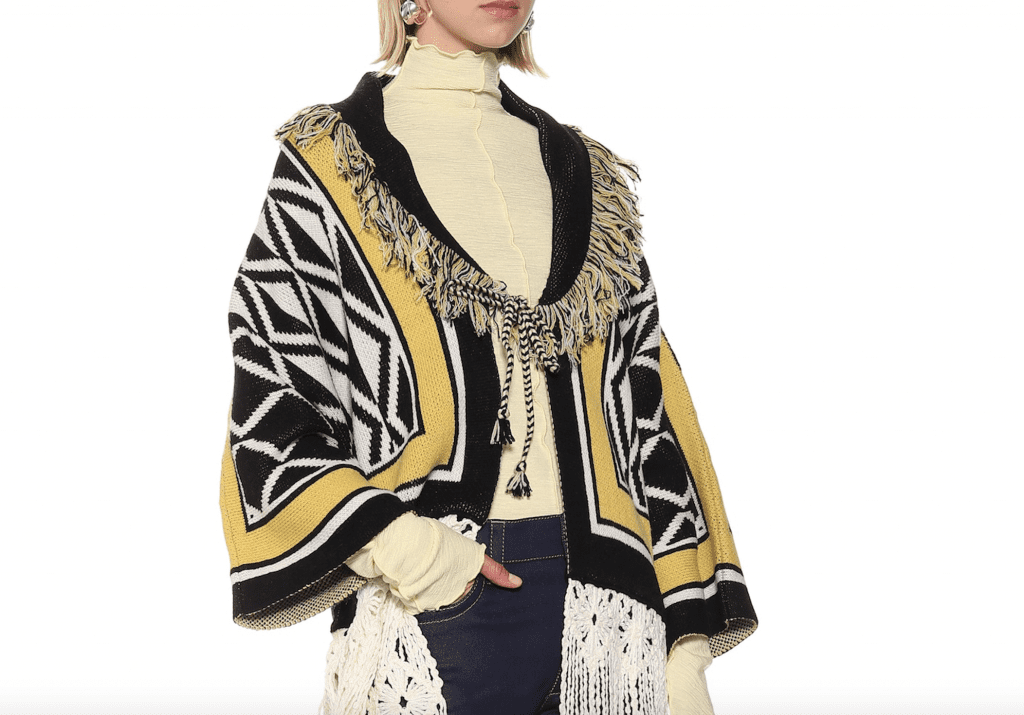Among the Alexander McQueen, Balenciaga, Gucci, Saint Laurent, and Valentino wares being offered up on München-based MyTheresa’s e-commerce website is an “oversized” bright yellow and black sweater from Italian fashion brand Alanui. With its intricately crafted geometric knitted jacquard made of wool, alpaca, and cashmere fibers, and accents of carefully woven fringe trim, MyTheresa describes the $2,500-plus Ravenstail Knitted Coat as “a wearable objets d’art,” one that comes straight from Alanui founder Nicolò Oddi’s workshop in Milan.
Look beyond the extravagant craftsmanship of the sweater from Alanui, a brand that is “defined by its colorful jacquard knitwear that pays homage to Native-American iconography,” and there is a problem. According to a Juneau, Alaska-based nonprofit organization, the sweater runs afoul of the law, and so do MyTheresa and its parent company Neiman Marcus for selling it.
In the striking new lawsuit that it filed in a federal court in Alaska on Monday, Sealaska Heritage Institute, Inc. (“SHI”) asserts that MyTheresa and Neiman Marcus are on the hook for selling the allegedly infringing sweater, which not only hijacks a copyright protected pattern, but also co-opts the name of a “specific, defined, and famous style of weaving and pattern” that is associated with Native American groups, namely, the Tlingit, Haida, and Tsimshian, thereby, violating a number of federal and state laws. (Alanui is not named as a defendant in the lawsuit).
Due to the “substantial copying” embodied in the Alanui sweater, which comes directly from a woven piece of art, called “Discovering the Angles of an Electrified Heart” created by Clarissa Rizal, “an Alaska Native resident,” SHI – a nonprofit that was “established to perpetuate and enhance the Tlingit, Haida, and Tsimshian cultures of Southeast Alaska” – claims that the retailers are violating federal copyright law by selling it.
By making use of a design that is “substantially similar” to that of Rizal’s registered work, for which SHI is the “exclusive world-wide licensee,” MyTheresa and Neiman Marcus have allegedly infringed SHI’s various exclusive rights in the work (including its right to reproduce the work and to prepare derivate works based on the original), and as a result, have violated its federal copyrights in the work.
This same conduct of MyTheresa and Neiman Marcus also gives rise to a violation of the Alaska Unfair Trade Practices and Consumer Protection Act, according to SHI’s complaint, as Rizal’s work is “an authentic piece of Alaska Native handicraft created by a resident of Alaska,” and thereby, protected against such alleged “unfair methods of competition, and unfair or deceptive acts or practices in the conduct of trade.”

More than merely running afoul of copyright law, SHI claims that MyTheresa and co. have engaged in False Designation of Origin by using the “Ravenstail” name in connection with the sweater, as their use of “the famous and distinctive Ravenstail term in connection with the sale of the [sweater] falsely suggests [its] origin as being the Tlingit, Haida, and Tsimshian peoples, and is likely to cause confusion or deceive as to the affiliation, sponsorship, or approval of the defendants’ product.”
Still yet, SHI goes on to also accuse MyTheresa and Neiman Marcus – which is reportedly on the brink of filing for Chapter 11 bankruptcy protection – of violating the Indian Arts and Crafts Act (“IACA”). A federal law that was passed in 1991, the IACA prohibits the “misrepresentation in the marketing of Indian arts and crafts products within the U.S.” In short: it prohibits non-natives from selling “any art or craft product in a manner that falsely suggests it was produced … by an Indian or Indian tribe.”
Despite such protection against misrepresentation, that is precisely what MyTheresa did, according to SHI, when it sold the lookalike sweater under the “Ravenstail” name, which “has for hundreds of years exclusively identified Tlingit, Haida, and Tsimshian products, specifically a textile woven in a specific manner and with a certain design,” and thus, “exclusively identifies products made by the Tlingit, Haida, and Tsimshian peoples.”
Since “the defendants are not Indians, Indian Tribes, or Indian Arts and Crafts organizations as defined by IACA,” their sale of the sweater under the “Ravenstail” name is a violation of the IACA, according to SHI, which says that after learning that the defendants were selling the sweater back in August 2019, it alerted Neiman Marcus – by way of its “online customer service mechanism” – of the “problematic and improper nature of the product.” However, despite “being made aware of the impropriety of their actions,” SHI claims that “the defendants continued to offer for sale and sell the infringing and offensive products,” and in at least some cases, are still doing so.
With the foregoing in mind, SHI has set forth claims of copyright infringement, false designation of origin, and violations of the IACA and Alaska Unfair Trade Practices and Consumer Protection Act, and is seeking no small amount of damages. In connection with the IACA claim, alone, SHI argues that it is entitled to “not less than $1,000 for each day that the ‘Ravenstail Knitted Coat’ was sold, or offered or displayed for sale, for each aggrieved individual Indian, Indian tribe, or Indian arts and crafts organization.” Moreover, the IACA states that if a business violates the Act, it can face civil penalties of up to $1,000,000.
In a statement to the AP on Monday, SHI’s counsel Jacob Adams said that the newly-filed suit “is part of a larger movement to recognize the rights of indigenous people to their cultural items,” as these items have “for a very long time, been seen as kind of resources that anyone can use.” The result, Adams says “goes beyond inspiration to outright violation.“
While the case is a relatively unique one in which a claim of appropriation has a basis in copyright law (there are not any internationally-recognized legal rights to protect traditional apparel and accessories designs), the IACA is not entirely unheard of. In fact, it has been raised against fashion companies in the past, most famously in connection with the case that the Navajo Nation filed against Urban Outfitters in 2012. In that case, the Navajo Nation accused the retailer of violating the IACA by selling a whole host of products – from necklaces and jackets to underwear and flasks – with the “Navajo” name attached to them.
The Navajo Nation, which is the largest Native American tribe in the U.S., alleged that such use of its name by the retailer violated federal and state trademark laws, as well as the IACA, while Urban Outfitters argued that “Navajo” is a generic term for a certain style or design, and not a designator of a single source (as required for trademark rights to exist), thereby, making its use of the term legally permissible. The case ultimately settled out of court.
A rep for Neiman Marcus did not respond to a request for comment.
UPDATED (August 29, 2020): SHI has filed an amended complaint to include Milan-based fashion brand Alanui and its founder Caroltta Oddi, as well as New Guards Group and its parent company Farfetched as defendants.
*The case is Sealaska Heritage Institute, Inc., v. Neiman Marcus Group LTD, LLC, Neiman Marcus Group, LLC, Neiman Marcus Group, Inc., and MyTheresa.com, GmbH, 1:20-cv-00002 (D. Alaska).











